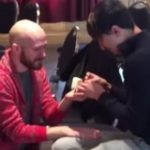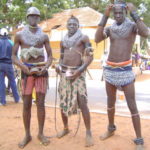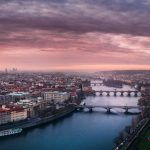Compiled by Richard Ammon
GlobalGayz.com
February 2012
Introduction
The land that is now Guinea (sometimes called Guinea-Conakry) belonged to a series of African empires until France colonized it in the 1890s, and made it part of French West Africa. Guinea declared its independence from France on 2 October 1958.
Islam is the majority religion for about 85% of the population; 8% are Christian, and 7% hold traditional animist beliefs. Guinean Muslims are generally Sunni and Sufi;there are relatively few Shi’a in Guinea.
Not surprisingly, there are strong social, religious, and cultural taboos against homosexual conduct and there are no lesbian, gay, bisexual, or transgender organizations that are active. Both male and female same-sex sexual activity are illegal in Guinea with a maximum penalty of three years imprisonment and a fine of up to one million Guinean francs.
From independence until the presidential election of 2010, Guinea was governed by a number of corrupt and brutal autocratic rulers, which has contributed to making Guinea one of the poorest countries in the world. (http://en.wikipedia.org/wiki/Guinea)
The literacy rate of Guinea is one of the lowest in the world: in 2003 it was estimated that only 42.6% of males and 18.1% of females were literate. Primary education is compulsory for 8 years, but most children do not attend for so long, and many do not go to school at all. In 1999, primary school attendance was 40 percent. Children, particularly girls, are kept out of school in order to assist their parents with domestic work or agriculture.
Treatment of Homosexuals
Information is scarce regarding the treatment of homosexuals by government authorities and by Guinean society in general. According to a working paper published by the World Bank, homosexuals in Guinea are “sometimes the victims of severe hate crimes”. The working paper, which focuses on gender issues as they pertain to HIV/AIDS projects in Africa, further states that, in Guinea, “fear and stigma” are associated with homosexuality. Similarly, the US State Dept Country Reports (Guinea) indicates there are “deep social, religious and cultural taboos” against homosexuality in Guinea (US 2010 Sec. 5).
Information is also scarce about how LGBT citizens actually feel and live. The hostile environment in Guinea toward homosexuals prevents any activist or rights group from forming. Most gay or lesbian individuals succumb to societal and religious strictures and are married with offspring to mask their truth. Furtive same-sex contact certainly exists but it is kept deeply hidden away from public view and countless ‘affairs of the heart’ remain unfulfilled.
Researching this story for GlobalGayz turned up virtually no inside information about gay life. The following single report about film making offers a small glimpse of the hidden emotions and severe conditions that gays encounter in very Muslim Guinea.
First African Movie about Homosexuality (1998)
The 1997 film Dakan (Destiny) made clandestinely in Guinea. Dakan has been variously described as the first West African film, the first Sub-Saharan film and the first film by a Black African to deal with homosexuality. Filming faced disruption from angry local protesters. See YouTube preview.
Manga and Sori are youngsters about to finish school. In the evening they meet, “to revise for exams”, as they tell their parents. Actually, they share amorous moments of tenderness in Sori’s car, or outside cafes. With Dakan as the first African movie about homosexuality, the Guinean actor Mohamad Camara tells a touching and humble love story.
In the film, however, the relationship is never consummated. For Camara this is a deliberate choice: “I’m not gay myself,” says the 39-year-old director, who is married with two children. “I just felt it was important for Africans to speak about homosexuality. Maybe it’ll help open the minds of the continent”.
But, after Dakan was first shown at Cannes, in May 1997, Camara faced an onslaught from African journalists. At home, in Guinea, he was cursed by a local imam after his appearance in a television debate on homosexuality. “I wasn’t surprised,” he says. “homosexuality is a dead-end in the African tradition, a taboo. Especially coming from a Muslim upbringing, like I do.”
Dakan (which translates to destiny) is the story of two men who, by coming out, disappear and become invisible to their families and society, because their society has no language which recognizes their love.
Filmed clandestinely in Guinea, Dakan both challenges the idea that there is a universal gay culture and debunks the notion that homosexuality is non-existent or foreign to African societies. In Camara’s words: “I made this film to pay tribute to those who express their love in whatever way they feel it, despite society’s efforts to repress it. The film deals with homosexual love in contemporary Guinea. It allows us to see the dangers in supposing there can be a universal gay narrative and it is also a charming narrative.”
The plot portrays Manga and Sory, two young men in love with each other. Manga tells his widowed mother of the relationship, and Sory tells his father. Both parents forbid their sons to see each other again. Sory marries and has a child.
Manga’s mother turns to witchcraft to cure her son and he unsuccessfully undergoes a lengthy form of aversion therapy. He meets and becomes engaged to a white woman called Oumou. Both men try to make their heterosexual relationships work but are ultimately drawn back to each other. Manga’s mother eventually gives her blessing to the pair and the end of the film sees Sory and Manga driving off together towards an uncertain future.
—————————-
Also see:
African Sexual Minorities & Gender Variant Resources
The 2009 massacre at Conakry
















